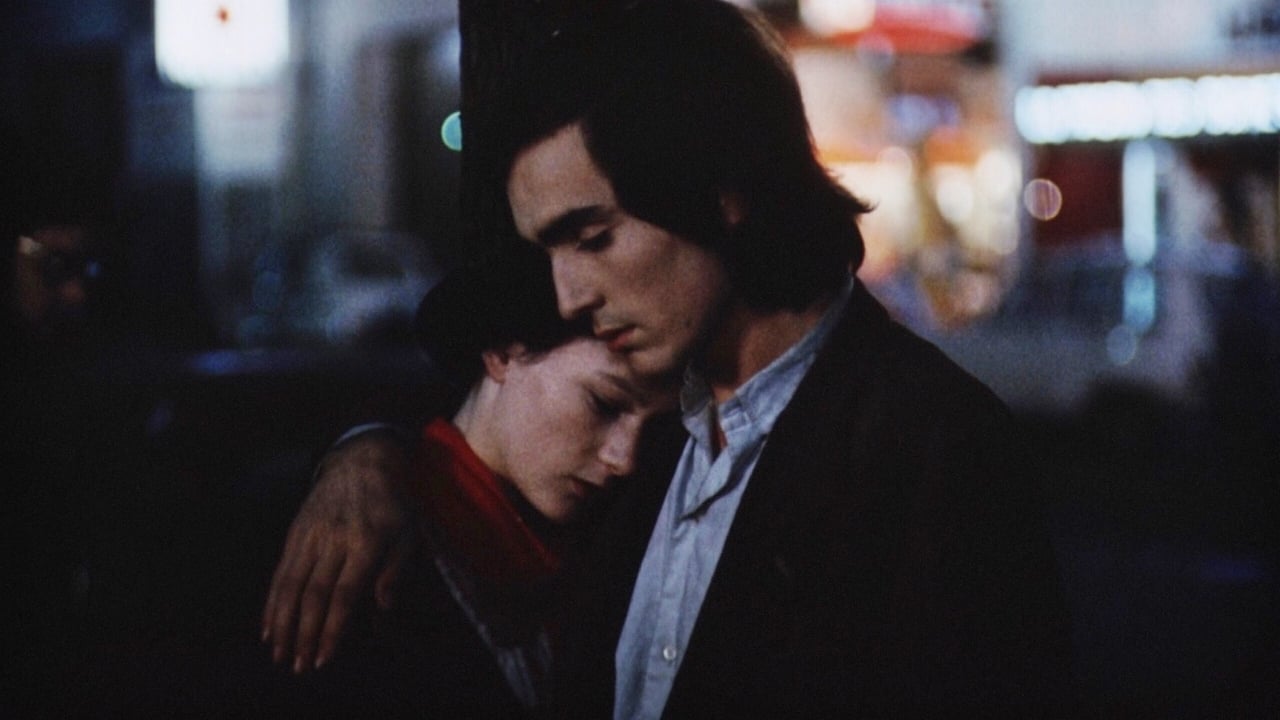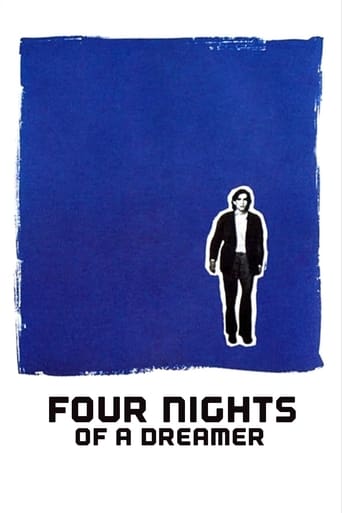

Quatre nuits d'un rêveur was shown in the U.S. with the title Four Nights of a Dreamer (1971). It's written and directed by Robert Bresson, based on the short story "White Nights" by Fyodor Dostoevsky. Bresson has moved Dosteovsky's story from 19th Century St. Petersburg to 20th Century Paris, which I think works very well. Both cities are centers of art and romance, and the story and film are all about art and romance.Jacques, a painter (Guillaume des Forêts), prevents Marthe (Isabelle Weingarten) from committing suicide, and naturally, he falls in love with her. (In view of Ms. Weingarten's sadness and her ethereal beauty, Jacques basically had no choice but to fall in love with her.)However, we soon learn that Marthe is in love with another man. He has been in the U.S. for a year, and was due home on that day. That fact that he did not call her is what prompted her suicide attempt.The film follows Marthe and Jacques for the four nights of the title. They walk the streets of Paris, and return to the Seine where musicians on a tourist boat are playing samba music. Jacques is serious about his painting, and discusses art with a friend who comes to visit.We know something is going to happen, but we don't know what. You'll have to see the film- -or read the short story--to find out what that something is.Bresson--as always--directs with the secure sure hand of a master. Every shot is beautifully framed, and we can almost feel the Paris night and hear the lapping of the Seine against its banks.We saw this intense, quiet film at the wonderful Dryden Theatre in Rochester's Eastman House. Other reviewers have noted that it's difficult to purchase on DVD. That's unfortunate, because it would work fairly well on the small screen, and it definitely is worth finding and seeing. It's a jewel-like masterpiece.
... View MoreThough one of Robert Bresson's lesser films, "Four Nights of a Dreamer" is perhaps his most influential.The plot here is simple: an artist wanders about Paris, observing its various female inhabitants. He loves these beautiful strangers, infatuated with the ideal they represent. He eventually meets Marthe, an attractive woman who is gloomy because her lover promised to meet her when he returned to Paris, but never showed up.The artist and the woman then spend four days together, sharing intimate stories and romantic gazes, but their relationship ends abruptly when Marthe's lover suddenly reappears. The artist then becomes disillusioned. The lesson: approach leads to destruction, there is no ideal, desire's can never be fully satiated and fantasies are fragile things. Paradoxically, they are precisely that which spurs man onward.7.9/10 – Though it lacks the polish of Bresson's major works, this little flick nevertheless set the template for later film romances such as "Once", "Before Sunset" and "Before Sunrise". With its long unbroken takes, loving shots of nighttime Paris, river ferries, street performers, musicians and a couple who "promise to meet up again in a year", this film laid the groundwork for a whole new sub-genre of romantic films. See too Minnelli's "The Clock". Worth two viewings.
... View More"Four Nights of a Dreamer" is my first Robert Bresson film, and my first impression of his style and ethos. This film is one of several adaptations of Fyodor Dostoyevsky's "White Nights", but from what I gather from reading about the other adaptations this is the only one worth seeing other than Luchino Visconti's lovely "Le notti bianche". While I enjoyed that film nearly as much as this one, "Four Nights of a Dreamer" is more striking and ambitious, thanks to Bresson's intelligent and thoughtful screenplay and the beauty of the cinematography and simple economy of Bresson's direction.The adaptation is loose, but needs to be. Dostoyevsky's writing is too reliant on the reader's perception and the emotional core of the story to be effective when literally translated to film, but is ripe for interpretation, and Bresson's is particularly interesting as he moves the story to 1970's France, introduces more emotion and passion to the characters, and actually makes the cinematic cliché of the aimless artist interesting and involving.The story is simple, Jacques (the 'dreamer') meets Marthe as she is about to commit suicide because her lover had promised to meet her that night after being away at Yale for a year but hadn't shown up, they become friends, share their stories over four nights until Marthe's lover shows up and they are forced to part. Bresson's script is remarkable, though, in its occasional wit and humor, in the uniqueness of its characters, in its observations on modern life and being in love. Even more impressive than the screenplay is the striking cinematography by Pierre Lhome, particularly during the nighttime scenes in Paris, which is shockingly beautiful at times. My first impression of a legendary director like Bresson could have resulted in disappointment, but I am now interested in exploring his filmography because I found his mute style so appealing. Most interesting was his ability to be very literal and clear through his use of the camera without seeming heavy-handed at any point. This is a wonderful, strikingly beautiful film.9/10
... View MoreI saw this film twice with Japanese subtitles. Tonight I saw a print (and very different version) with English subtitles. In this film, Bresson makes everyday life beautiful.... the lights on the river, the Brazilian music coming from a beautifully lighted tour boat going under the bridge the lovers are on... The story is small... An aimless artist prevents a woman from suicide and listens to her story and tries to help her reunite with her lover. This story seems to be seen through a dark filter of the beauty of Paris and its people. A scene where the heroine is making love in the next room while her mother is walking back and forth calling her name, not realizing that her daughter is right next door... Her voice gets louder and softer and louder...The scene with the aimless artist following one beautiful woman, only to be distracted by another beautiful woman whom he then follows....There are many small beauties in this film. And my telling you about them will only make you anticipate them with pleasure. Bresson, working with a minor little story has created a film of great beauty. Good luck finding it....I was fortunate enough to see it at a theater twice, where the beauty of the scenery could be appreciated. For some reason, it is not out in video or DVD. The DVD I saw probably had the photographer setting up his camera in the dark theater... and shooting at the screen!
... View More